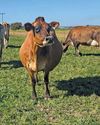Versuchen GOLD - Frei
Seek and destroy: bio-soldiers for healthy crops
Farmer's Weekly
|17 May 2024
Bio-controls are an increasingly favoured method of dealing with crop pests as they provide a long-term solution to farmers that does not negatively impact market access. Lindi Botha reports on how bio-controls should be approached for maximum success.

The serenity and calm of the Mahela citrus orchard in Letsitele, Limpopo, at dawn belies the full-scale war that is taking place on the farm. Among the branches of this lush and verdant orchard, a silent fight for survival is unfolding as armies of predatory insects stand primed to sniff out their prey, invade and kill their adversaries. Behold nature’s avengers: guardians of the harvest, maintainers of the natural balance and those that ensure farms will keep producing for years to come.
Eddie Vorster, director of Mahela, is one of a growing group of farmers turning to biocontrols to ward off pests in their orchards. These predatory insects, parasites and beneficial microorganisms come without the detrimental effects on eco-systems that result from using synthetic chemical pesticides. Furthermore, farmers are able to comply with food safety regulations while protecting their crops, since these natural solutions don’t leave chemical residues that could keep the produce out of the market.

A PEST-SPECIFIC SOLUTION
Bio-controls also appeal to farmers wanting to maintain biodiversity to extract the full benefit of an eco-system in harmony. Since the biocontrols are pest-specific, farmers don’t risk wiping out other insects on the farm as they would when using chemical pesticides. An added benefit is that bio-controls offer another tool to combat pests so that solutions can be alternated, thereby eliminating resistance build-up.
Diese Geschichte stammt aus der 17 May 2024-Ausgabe von Farmer's Weekly.
Abonnieren Sie Magzter GOLD, um auf Tausende kuratierter Premium-Geschichten und über 9.000 Zeitschriften und Zeitungen zuzugreifen.
Sie sind bereits Abonnent? Anmelden
WEITERE GESCHICHTEN VON Farmer's Weekly
Farmer's Weekly
Farmers 'unilateral victims' of climate
Gyeongbuk Provincial Council member Choi Taerim has demanded immediate and substantial support for apple farmers in the South Korean province, urging immediate measures for apple farmers affected by heat damage be implemented, The Asia Business Daily recently reported.
1 min
November 21-28, 2025

Farmer's Weekly
Top agri workers celebrated in the Western Cape
Shannon Robertson, assistant livestock manager at Boschendal near Franschhoek, was crowned the overall winner of the 2025 Western Cape Prestige Agri Awards, held in Durbanville.
1 min
November 21-28, 2025

Farmer's Weekly
Smart dairying: running Jerseys on pasture
The dairy farming sector has seen innovation in milk parlour and cow comfort technology that have allowed farmers to not only yield higher volumes, but extend the productive lifespan of their cows. Albrecht de Jager told Henning Naudé about his approach to maintaining a pasture-raised Jersey herd while utilising precise data measuring technology to ensure quality milk output and optimal cow comfort.
6 mins
November 21-28, 2025

Farmer's Weekly
High-performance dairy farming in the Eastern Cape: the Rufus Dreyer approach
Dairy farming is often described as one of the most technically demanding and strategically complex branches of agriculture.
6 mins
November 21-28, 2025

Farmer's Weekly
Design your stables and camps to assist in AHS control
Keep horses away from areas where disease-carrying midges multiply, like natural pools, lakes, streams and dams, advises Dr Mac.
2 mins
November 21-28, 2025

Farmer's Weekly
The rolling chant that has echoed through SA over the past 30 years
Johan van der Nest is renowned in auction circles and was the first freelance stud-stock auctioneer to begin operating in South Africa.
10 mins
November 21-28, 2025

Farmer's Weekly
Flight from the Red Army
The fall of the Third Reich in 1945 was defined by the Red Army's brutal invasion of Germany. Mike Burgess tells how the Hoppe family trekked from Finowfurt near Berlin to Preetz in Schleswig-Holstein to escape the brutality.
6 mins
November 21-28, 2025

Farmer's Weekly
How to plan a pre-sale feeding programme
Proper feeding of animals before a sale can help producers catch the eye of buyers and increase profits, but it is important to choose the right ration.
8 mins
November 21-28, 2025

Farmer's Weekly
How women are transforming coffee production in Kenya
A group of Kenyan smallholder women farmers are transforming the country's high-value coffee sector by pooling their resources.
5 mins
November 21-28, 2025

Farmer's Weekly
Tough times ahead for SA's grain farmers
Grain farmers face a difficult year ahead with lower grain prices and high production costs
3 mins
November 21-28, 2025
Listen
Translate
Change font size

